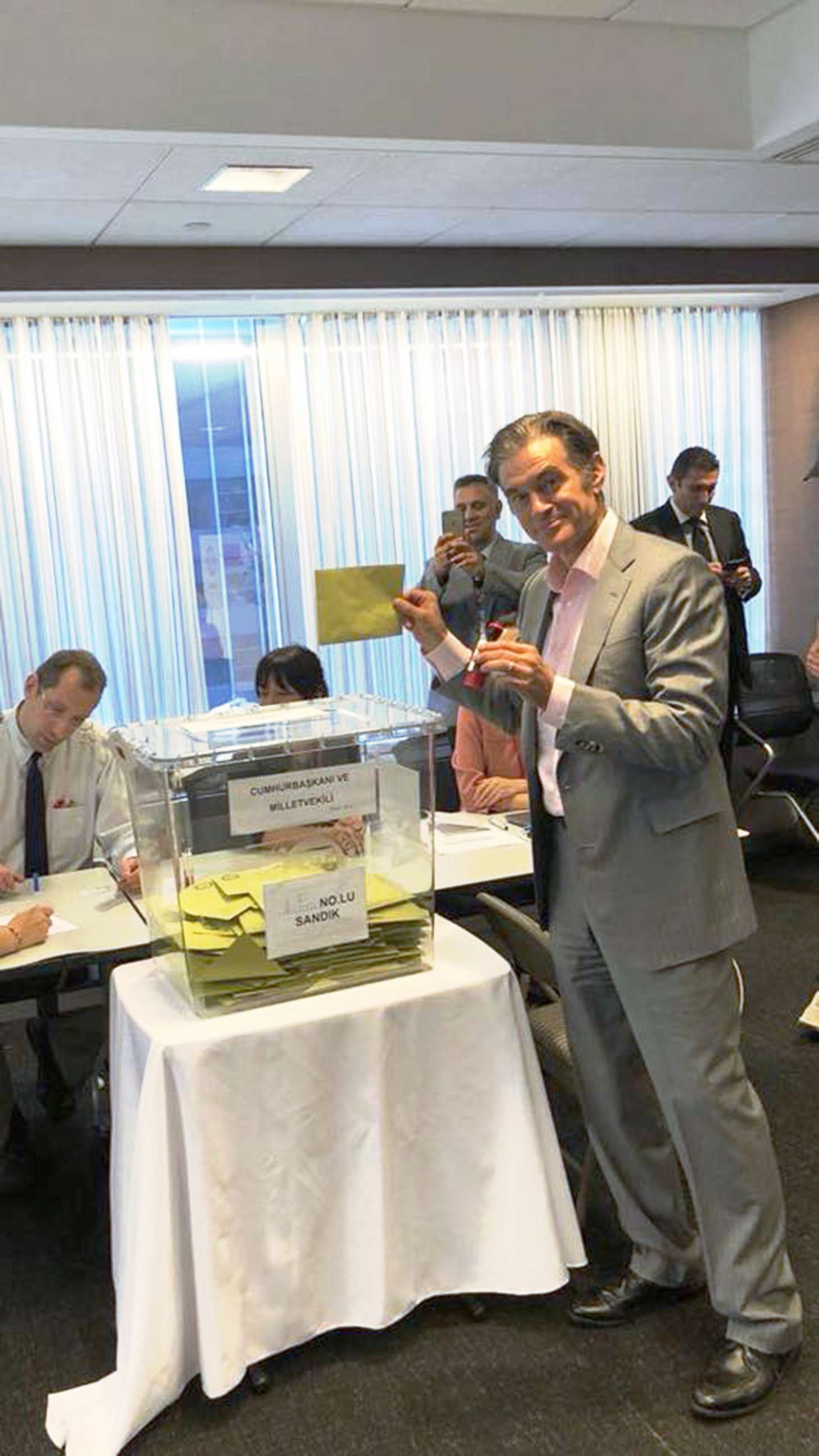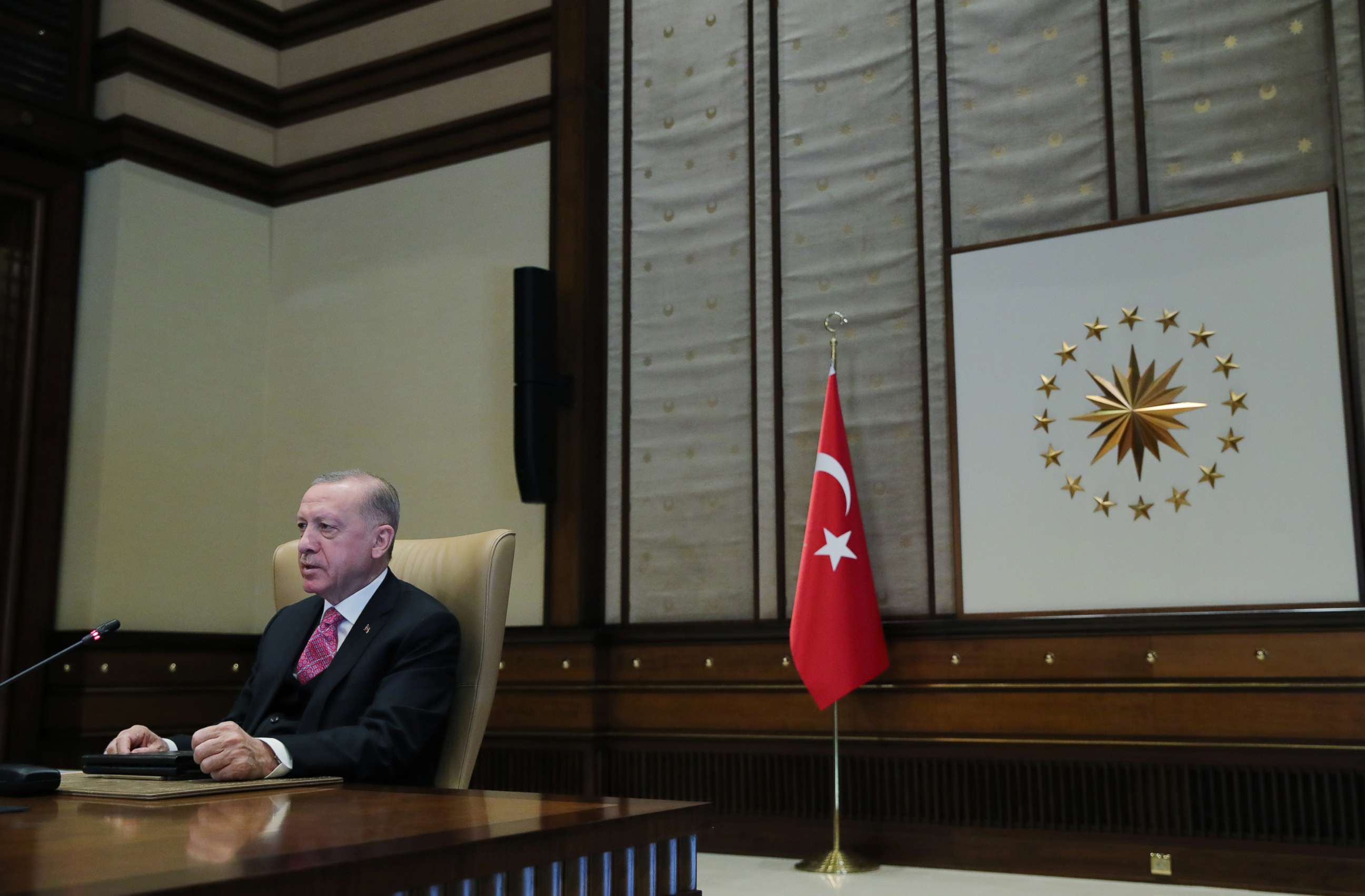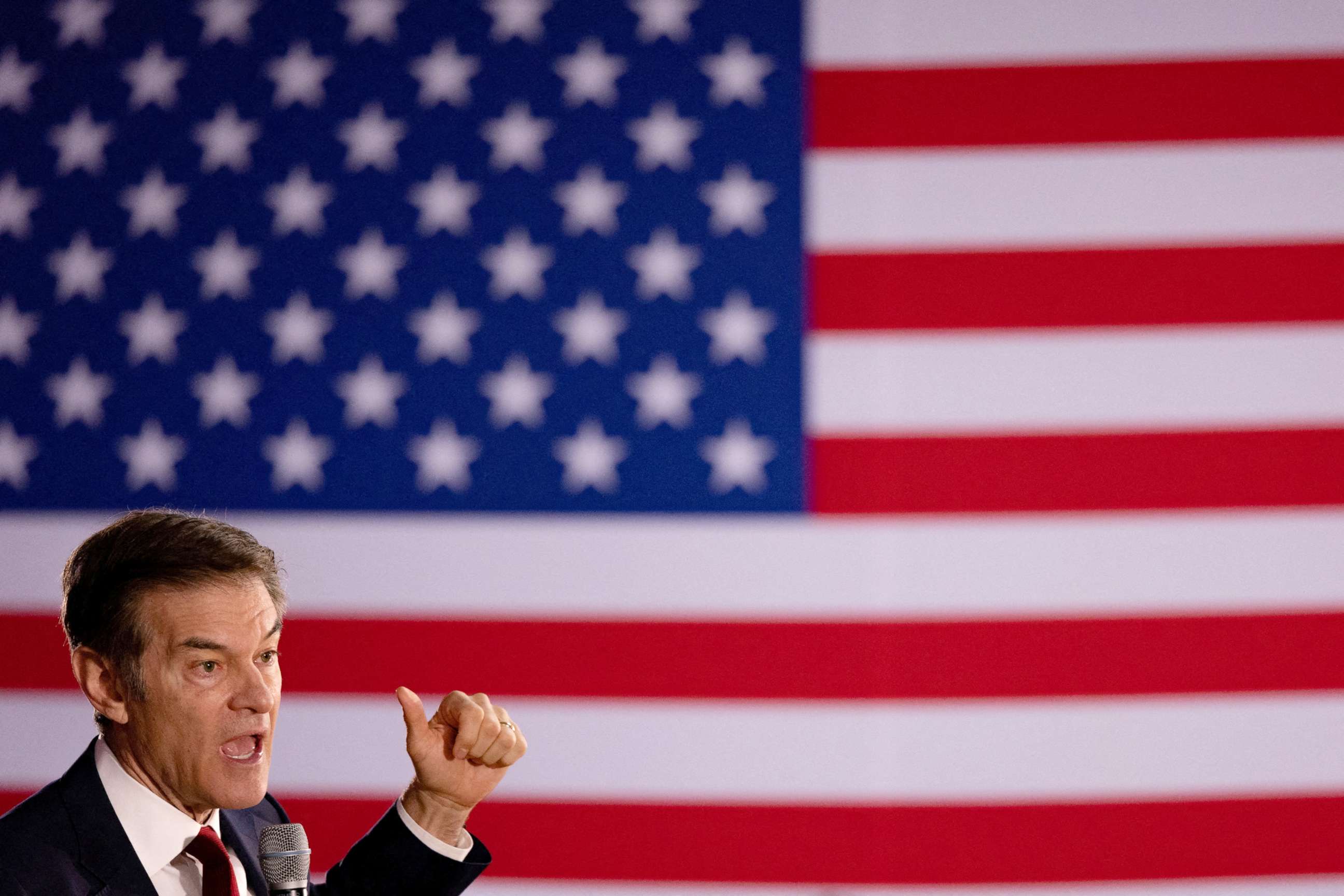Dr. Oz's vote in 2018 Turkish election renews criticism
The celebrity doctor scored a key endorsement from Donald Trump last month.
As Dr. Mehmet Oz embarks on a bid for the U.S. Senate, the television star has largely shied away from discussing his ties to Turkey, where he maintains citizenship, and dismissed criticism from political opponents that he harbors any so-called "dual loyalties."
But a photograph of Oz casting a ballot in Turkey's 2018 presidential election is rankling some national security experts -- particularly after recently saying he has "never been politically involved in Turkey in any capacity."
"The decision to vote in a foreign country's election is problematic from a security clearance perspective," according to John V. Berry, a former government lawyer with expertise in federal security clearances.
After a rocky start to his campaign, Oz recently earned a coveted endorsement from former President Donald Trump, bolstering his chances of capturing the Republican nod. But political opponents have continued to target his connections to Turkey -- a strategy the Oz campaign and others have called xenophobic smears. If elected, Oz has said he would renounce his Turkish citizenship.
When asked about the photograph, which appeared in June 2018 on the Facebook page of Turkey's consulate in Manhattan, Brittany Yanick, an Oz campaign spokesperson, confirmed its authenticity to ABC News and confirmed that Oz did vote in the 2018 election. According to Yanick, Oz voted for opposition candidate Muharrem Ince in his unsuccessful campaign against Turkish President Recep Tayyep Erdogan. She denied that Oz's vote amounted to "political involvement."

"Voting in an election is far different from being actively engaged in the political work of the Turkish government, which Dr. Oz has never been involved with," Yanick told ABC News. "There is no security issue whatsoever."
Elected officials are not subjected to the same level of scrutiny as civilians who seek security clearances for sensitive government work; once sworn-in, lawmakers are granted access to classified information, unless the executive branch denies them certain information.
But the background check process for civilians can also "provide a framework for analyzing whether someone is trustworthy or not," according to Kel McClanahan, the executive director of National Security Counselors, a nonprofit public interest law firm. And for McClanahan, voting in another country's election would set off a "giant, flashing red light."
Born and raised in Ohio, Oz has said that he maintains dual U.S.-Turkey citizenship to care for his mother in Turkey, who suffers from Alzheimer's disease. He also served in the Turkish army for 60 days in the early 1980s -- reportedly to retain his Turkish citizenship -- and maintains real estate holdings in Turkey, plus has an endorsement deal the country's national airline, Turkish Airlines.
"Any single one of those would be enough to torpedo a [security] clearance," McClanahan said. "Taken together, I would not put good odds on that person getting a clearance anywhere."
Turkish voting records indicate that the 2018 presidential election was the first in which Oz participated. Prior to the 2014 election, Turks living abroad could only vote by returning home or by visiting polling stations set up on Turkey's borders.
Yanick, the campaign spokesperson, said Oz did not plan to vote in the 2018 election, but decided to cast a ballot while at the consulate discussing his "humanitarian work on behalf of Syrian refugees in Turkey."
"It was during an election season, so he voted," Yanick said.
Other security experts ABC News spoke with expressed less concern with Oz's 2018 vote. Steve Aftergood, a senior analyst at the Federation of American Scientists, said that because Oz has been transparent about his ties to Turkey, his dual citizenship alone is more of a political concern for him than a risk to national security.
"The fact that [Oz] has made no effort to conceal his dual citizenship counts in his favor," Aftergood said. "Voters will have an opportunity to decide whether or not it is of concern to them."
Security experts that ABC News consulted emphasized that the country in question matters when considering potential foreign influence risks. A person's ties to Turkey, a NATO member and strategic ally to the U.S., present far less of a threat than China or Russia.
But in recent years, Turkish President Erdogan has demonstrated increasingly authoritarian behavior, jailing journalists and summarily silencing opposition voices. Erdogan has also strained ties with the U.S. by purchasing Russian weapons systems.
Richard Grenell, the former Director of National Intelligence under President Trump, characterized Oz's understanding of Turkey an asset in the fight against authoritarianism.
"It is frankly un-American to suggest that first- and second-generation Americans are unworthy or suspect to work as a U.S. official," Grenell said. "They've seen fascism and totalitarianism and are actually more clear-eyed about what is at stake."
Background check investigators consider "the totality of circumstances" when investigating those seeking security clearances, said Sean Bigley, a national security lawyer and former Trump-appointee to the National Security Education Board. Bigley said Oz's portfolio of risk would likely include his existing financial ties to Turkey.
According to financial disclosures submitted in April, Oz owns several hundreds of thousands of dollars in real estate property in Turkey, including a building he has leased out to the Turkish Ministry of Education for free. The building is being used as a student dormitory, according to his disclosure form, and "is subject to pending trust and estate litigation."

The disclosure form also shows Oz scored a lucrative endorsement contract with Turkish Airlines, Turkey's national flag-carrying airline. Experts say the air carrier has grown increasingly close to Erdogan since 2018, when he named himself chairman of the country's sovereign wealth fund, which holds a 49% stake.
In 2018, Oz appeared in a Super Bowl advertisement for Turkish Airlines, and in 2021, he appeared in a four-minute informational discussing the airline's COVID-19 safety protocols as a brand ambassador.
Any wealth Oz has accumulated from his interests in Turkey, including the airline deal, would reflect only a small amount of his full financial picture. In all, Oz's disclosure shows that he and his spouse together own between $104 and $422 million in various assets and holdings.
Even so, Bigley said, "if I were advising [Oz], I would suggest divesting from any assets or ... financial ties with any entity of the Turkish government."
Oz has faced criticism for not using his celebrity prominence as a platform for denouncing Erdogan's clampdowns on opposition and other democratic backsliding. Some suggest that Oz's continuing financial interests in Turkey create a disincentive for him to criticize its leadership, as doing so could put Oz at risk of having his Turkish assets seized.
"It is the nature of the Turkish system and authoritarian systems more generally that folks who do not want to be targeted by the state kowtow to leaders or keep their mouth shut," said Steven Cook, a senior fellow at the Council on Foreign Relations. "There are many examples of people who have dared to criticize Erdogan who have been forcibly divested."
Nicholas Danforth, a non-resident fellow at the Hellenic Foundation for European and Foreign Policy, an Athens-based think tank, agreed.
"If you wanted to have a lucrative career as a spokesman for Turkish Airlines, you certainly couldn't say anything negative about Erdogan," Danforth said.
According to several news reports published since launching his campaign, Oz has met with Erdogan on at least two occasions, in 2014 and 2018, and attended events with officials in Erdogan's party. Oz has said that attending these functions was normal for a Turkish-American of his stature.
Asked whether Oz had taken a public stance against Erdogan, Yanick provided ABC News with comments Oz made at a January 2022 campaign event in which he said he "would be the harshest critic of Erdogan" in the Senate.

"The country that I respected when I was growing up -- Turkey, the country my father left -- was a secular country where there was no significant Islamic rule elements, period," he said. "And it was not a dictatorship."
Hailed in the West as a charismatic leader with the potential to return Turkey to its secular roots, Muharrem Ince fell to Erdogan in the 2018 election by a substantial margin -- 52 percent to 30. Ince attracted support from a broad coalition of anti-Erdogan parties, but also expressed some controversial opinions -- including an interest in rebuilding ties with Syrian President Bashar al-Assad.
"Ince was hardly a paragon of democracy, human rights, and tolerance," said Cook.
As one of Turkey's most recognizable figures in the West, Oz is not the first high-profile candidate to face accusations of a so-called "dual loyalty," a claim reminiscent of attacks against Catholics, Jews and members of other religious and ethnic groups in previous generations.
During the 2016 presidential campaign, then-candidate Donald Trump accused Sen. Ted Cruz, R-Texas, of maintaining dual loyalties to Canada, his country of birth, even though Cruz had renounced his Canadian citizenship in 2014. Trump has not expressed any similar concern for Oz's arrangement.





